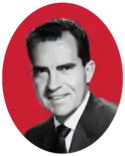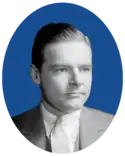1960 Republican National Convention
The 1960 National Convention of the Republican Party of the United States was held in Chicago, Illinois, from July 25 to July 28, 1960, at the International Amphitheatre. It was the 14th and most recent time overall that Chicago hosted the Republican National Convention, more times than any other city.
| 1960 presidential election | |
  Nominees Nixon and Lodge | |
| Convention | |
|---|---|
| Date(s) | July 25–28, 1960 |
| City | Chicago |
| Venue | International Amphitheatre |
| Candidates | |
| Presidential nominee | Richard M. Nixon of California |
| Vice presidential nominee | Henry C. Lodge Jr. of Massachusetts |
The convention nominated Vice President Richard M. Nixon for president and former Senator Henry Cabot Lodge Jr. of Massachusetts for vice president.
The Presidency
By the time the Republican convention opened, Nixon had no opponents for the nomination. The highlight of the convention was the speech by U.S. Senator Barry Goldwater of Arizona removing himself from the race, in which he called on conservatives to "take back" the party. Nixon won easily, earning 1,321 votes to 10 for Goldwater.[1] At the convention, Nixon promised that he would visit every state during his campaign.[2]
The Vice Presidency
After winning the presidential nomination, Nixon considered several candidates for the vice presidential nomination. Incumbent President Dwight D. Eisenhower strongly supported Henry Cabot Lodge Jr., the United States Ambassador to the United Nations.[3] Though Lodge was not viewed by Republicans as a charismatic speaker, his foreign policy experience made him an appealing candidate.[3]
Lodge was unpopular with the conservative wing of the party, who regarded him as a Northeastern moderate.[3] As a result of the conservatives' coolness toward Lodge, Nixon strongly considered conservative Minnesota Representative Walter Judd and U.S. Senator Thruston Morton of Kentucky, an establishment Republican who was more moderate than Judd but had a high profile as chairman of the Republican National Committee.[4]
Other candidates Nixon considered include:
- Robert B. Anderson, U.S. Treasury Secretary from Texas
- Prescott S. Bush, U.S. Senator from Connecticut, and father of future 41st President George H.W. Bush
- Everett M. Dirksen, U.S. Senate Minority Leader from Illinois
- Arthur S. Flemming, U.S. HEW Secretary from Ohio
- Gerald R. Ford, U.S. Representative from Michigan (Would become Nixon's Vice President in the future)
- Barry M. Goldwater, U.S. Senator from Arizona (Would be nominated for President in 1964)
- Alfred M. Gruenther, former NATO Supreme Commander from Nebraska
- Charles A. Halleck, U.S. House Minority Leader from Indiana
- Neil H. McElroy, former Secretary of Defense from Ohio
- James P. Mitchell, U.S. Labor Secretary from New Jersey
- Charles H. Percy, businessman from Illinois
- Nelson A. Rockefeller, Governor of New York
- William P. Rogers, U.S. Attorney General from Maryland
- Hugh D. Scott, U.S. Senator from Pennsylvania
- Frederick A. Seaton, U.S. Interior Secretary from Nebraska
- William G. Stratton, Governor of Illinois
- Philip Willkie, son of Wendell Willkie, the party's 1940 presidential candidate and member of the Indiana House of Representatives
After deciding on Lodge, Nixon participated in a closed session with party leaders, who concurred with his preference.[4] After the session, Nixon announced his choice publicly, and the convention ratified it.
General election
The Nixon-Lodge ticket lost the 1960 election to the Democratic ticket of John F. Kennedy and Lyndon B. Johnson.
See also
- History of the United States Republican Party
- List of Republican National Conventions
- U.S. presidential nomination convention
- 1960 Democratic National Convention
- 1960 United States presidential election
References
- "Archived copy". Archived from the original on 2008-07-19. Retrieved 2009-03-29.CS1 maint: archived copy as title (link)
- "Richard Nixon: Address Accepting the Presidential Nomination at the Republican National Convention in Chicago". www.presidency.ucsb.edu.
- Donaldson, Gary (2007). The First Modern Campaign: Kennedy, Nixon, and the Election of 1960. Rowman & Littlefield. pp. 90–91. ISBN 9780742548008. Retrieved 6 October 2015.
- Pietrusza, David (2008). 1960: LBJ Vs. JFK Vs. Nixon : the Epic Campaign that Forged Three Presidencies. Sterling Publishing Company. pp. 225–230. ISBN 9781402761140. Retrieved 6 October 2015.
External links
- Republican Party platform of 1960 at The American Presidency Project
- Nixon nomination acceptance speech for President at RNC (transcript) at The American Presidency Project
- Universal newsreel footage of the convention
- Video of Nixon nomination acceptance speech for President at RNC from C-SPAN (via YouTube)
- Audio of Nixon nomination acceptance speech for President at RNC
- Video of Lodge nomination acceptance speech for Vice President at RNC from C-SPAN (via YouTube)
| Preceded by 1956 San Francisco, California |
Republican National Conventions | Succeeded by 1964 Daly City, California |